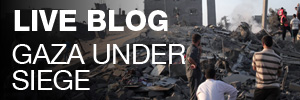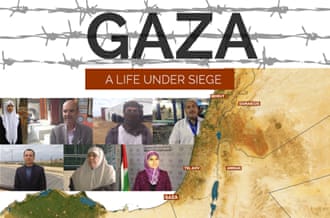Pounded by three wars in the past six years, what's to stop a reconstructed Gaza being bombed again in the future?

In Gaza, 80 percent of Palestinians are dependent on aid [AP]
|
| The terrible scale of destruction in Gaza isn't even the start of it. As a three-day truce last week made clear, Israel's 29-day military offensive has levelled the Palestinian strip: entire neighbourhoods reduced to rubble; thousands of homes destroyed, leaving at least 65,000 people homeless.
Schools, hospitals, mosques, a university, a sewage plant, the strip's only power plant and dozens of factories were hit. Stark images depicting the damage have accompanied stunned words from humanitarian workers. Trond Husby, who heads the UN's development programme in Gaza, told the UK's Daily Telegraph newspaper: "I was in Somalia for two years, Sierra Leone for five, and also South Sudan and Uganda, and this beats them all for the level of destruction."
If the material ruin defies comprehension, the human toll is all but unspeakable: To date, 1,911 deaths, with UN figures indicating that three-quarters of those killed were civilian, including 429 children. Close to 10,000 injured people - some of them disabled for life - including 2,000 children. And we haven't yet got to the deeper shattering, the traumatised minds that professionals will try to piece back together - some 400,000 children in Gaza are in need of psycho-social support, according to the UN children's fund, UNICEF.
But what adds another layer of tragedy to this shocking level of injury is that Gaza has been here before. Several times. We are witnessing the latest, most punishing round of a catastrophic cycle in Gaza, whereby pounded homes and lives are rebuilt with the help of international aid, only to be torn apart again a few years later. Small wonder, then, that UN Secretary General Ban Ki-moon, speaking at a special meeting of the General Assembly on Wednesday, said: "We will build again but this must be the last time to rebuild. This must stop now."
In Gaza, Palestinian and international aid workers alike reel off lists of buildings that had only recently been restored after previous Israeli offensives, only to be decimated again in the latest offensive. That vital - and US-insured - power plant that Israel knocked out in late July? It was bombed out of action back in 2006, too, during Israel's Summer Rain offensive.
Sewage plants? Israel bombed those in 2014, as it did during 2006 and again during the 2008-2009 Cast Lead assault on Gaza. Najla, an aid worker for 11 years, said by phone from Gaza City: "For many years it has been like this, even between the big attacks there are always incursions and small scale operations. Israel bombs a place, it is rebuilt, they bomb it again."
Aid agencies now fear long delays in reconstruction because of Israel's restrictions and red tape over the materials allowed into the Gaza Strip. But even if Gaza is restored - a task estimated to take at least 10 years - there are no guarantees that, as Ban has urged, it will be the last time.
It isn't enough for the international community to just provide aid - which effectively makes humanitarian hostages of donor nations, since their vital assistance is at the same time letting the country that carried out the destruction off the hook. Foreign aid is part of the Oslo Accords of 1993, intended for "state-building" projects in the occupied Palestinian territories, in anticipation of the Palestinian state that would follow negotiations. But it never did.
So for decades, a resource- and skills-rich society that could comfortably stand on its own feet has been stunted into aid-dependency for no reason other than the choking Israeli occupation - and the international community's lack of political will to end it.
Even before this latest offensive, 80 percent of the Gaza population was dependent on aid. And even in the devastated aftermath of it, one 40-year-old Palestinian in Gaza city told me by phone: "You cannot imagine how upset people are, doctors, nurses, mothers, everybody queuing for bread. People want this war to bring them back some dignity."
On the ground, humanitarian agencies, too, urge that the siege of the strip has to stop. On Saturday, Chris Gunness, spokesperson for the United Nations Relief Works Agency in Gaza, said he recognised Israel's security concerns, but added: "We cannot rebuild [Gaza] with our hands tied behind our backs. The blockade must end."Donor countries around the western world have seen tens of thousands take to the streets to make the same case. Eight years into a devastating Gaza blockade punctuated only by three pounding rounds of war, it is long past time for the world's politicians to take heed. |



No comments:
Post a Comment